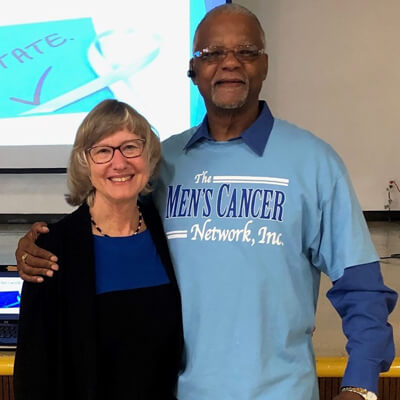During the COVID-19 pandemic and at the height of the Black Lives Matter movement, researchers assembled a recruitment dream team and joined with African American men who are prostate cancer survivors to “do what is needed for future generations.”
African American men have disproportionately higher prostate cancer rates, with an earlier onset, and twice the prostate cancer mortality than other racial groups. These outcomes are difficult for University of Southern California (USC) researchers to accept.
Their efforts, led by USC genetic epidemiologist Dr. Christopher Haiman, to assemble a recruitment dream team to build bridges was validated when more than 12,600 African American men raised their hands to volunteer for the RESPOND Study , exceeding the team’s recruitment goals and defying decades of research regarding African American men’s unwillingness to participate in medical research.

As principal investigator, Haiman led RESPOND, or Research on Prostate Cancer in Men of African Ancestry: Defining the Roles of Genetics, Tumor Markers, and Social Stress, as its name states. The study’s uniquely holistic design assesses a variety of potential factors contributing to African American men’s prostate cancer disparities, including socioeconomics, social stress, germline genetics, and tumor genetics.
It also builds upon Haiman’s research using genome-wide genotyping and next-generation sequencing technology to find cancer risk factors.
“RESPOND uses very sophisticated methods, geospatial information systems (or GIS), to look at what’s going on in African American men’s lives, family histories, and environments that may contribute to why they are 65% more likely to be diagnosed with prostate cancer than other racial and ethnic minority groups, and why their disease is often more aggressive,” Haiman explained.
The team is also examining the role of structural factors in prostate cancer risk.
“We want to know the impact of things like redlining and how factors related to living in divested neighborhoods could impact risks as well as survival of prostate cancer,” he added.
Redlining is a discriminatory practice of systematically denying financial opportunities, like mortgage access, to residents of specific neighborhoods and, often disproportionately, negatively impacts racial and ethnic minority groups. Historical redlining continues to have consequences today.
The Assembly of a Dream Team
To find African American men willing to answer questions about their experiences with discrimination, consent to researchers analyzing their tumor tissue, and mail in saliva samples as the RESPOND protocol requires, Haiman called on Dr. Ann Hamilton, an epidemiologist also at USC, to lead recruitment.
For 24 years, Hamilton led several successful prostate cancer studies —some following survivors for up to 15 years—to evaluate treatments and patterns of care as they’ve evolved, but with lingering disappointment about the lack of representation.

“None of these studies focused exclusively on African American men,” Hamilton recalled. “Maybe 10% of the men in these previous studies were African Americans, and these were multi-registry studies.”
With Haiman’s vision and technological expertise and Hamilton’s community contacts and recruitment expertise, they’ve amassed the largest cohort to date of African American men participating in a prostate cancer study.
RESPOND’s cohort largely consists of men recruited from cancer registries in seven states, representing approximately 40% of all African American men newly diagnosed with prostate cancer in the United States. The recruitment progress wouldn’t be possible without the team’s partners , who are patient advocacy groups, university collaborators, and community volunteers:
- Prostate Health Education Network
- The Prostate Network
- The Prostate Cancer Foundation
- The Men’s Cancer Network
- ZERO – The End of Prostate Cancer
Other experts contributing to the study include Drs. Scarlett Gomez, Franklin Huang, John Carpten, Karen Sfanos, Tamara Lotan, and David Conti.
How They Did It
RESPOND’s recruitment team began asking African American men to join their study when it would have been understandable for them to say ‘no’—and some did—but because of how their team showed up, the men did, too.
“We started asking African American men to participate in our study during the COVID-19 pandemic as well as Black Lives Matter when hospitals were overwhelmed with COVID-19 patients,” Haiman recalled. “This occurred in the face of many kinds of adverse issues happening in the world that posed several challenges we had to navigate with sensitivity.”
Amid growing COVID-19 cases and deaths, many research studies across the country were being suspended. Given that the RESPOND team had completed their focus groups with African American men before the pandemic, planned recruitment for RESPOND carried on.
“During our focus groups and interviews, we addressed and validated mistrust issues with the men and met weekly so our interviewers could talk through the reactions they were receiving and how best to respond,” Hamilton explained.
The men had concerns about content on RESPOND’s questionnaire, which included questions like: Have you ever been stopped unfairly by the police? Have you been followed around in a store? Have you been denied a promotion?
“The interviewers got pushback from the men because the men didn't really understand what those questions had to do with prostate cancer,” Hamilton described. “We spent time developing scripts for our interviewers about the connections, for example, how prolonged social stress contributes to inflammation and the development of disease.”
Confidentiality was another issue raised by the men when investigators asked them to contribute saliva samples and tumor tissue. Hamilton recalled how participants had stories about police using DNA to find suspects, so providing saliva samples was a concern.
“We made it clear that the study had no connection to law enforcement,” she recalled. “When we better explained how we were ethically bound to protect their identities, I think the men better understood what we were trying to do and were more willing to participate.”
The pandemic did impact some aspects of the study.
According to Dr. Danielle Daee, RESPOND’s National Cancer Institute (NCI) program director, planned in-person outreach activities had to be canceled, and biobanks delayed sending tissue samples to the team because of the staffing issues they were experiencing.
“The perseverance of these researchers during this time was critical to the success of this project,” she added. “Despite these challenges, recruitment remained steady throughout the project, and tissue attainment rebounded post-pandemic.”
Showing Up for Generations
What led 12,600 African American men to volunteer for RESPOND? It could be the suggestion made via the study’s acronym, but representation also matters. Was it having African Americans in prominent roles on the research team as recruiters or endorsements on the RESPOND website from influential African Americans? Or maybe it was the timing and temperature—men quarantining at home were accessible, and the interview questions allowed them to talk about real-life stressors—not just at that time but in their everyday lives.
“It could be a combination of these elements, as we were just as intentional in our recruitment strategy as in our analysis design,” Hamilton replied. “The men told us what resonated was the benefit their participation in our study could have for future generations; for instance, they were motivated because of what their contributions could mean for their grandsons.”
Hamilton said every move the team made was what African American focus group participants advised them to do, from their list of frequently asked questions to the brochures and surveys distributed and the development of the study website.
Many Future Benefits
As RESPOND moves from recruitment to data analysis, Haiman continues planning what he and other researchers can learn from this cohort.
Could the type of care the men receive affect survival? With their population sample, plans are in the works to submit future grants examining how access to care varies.
“We’re interested in several existing studies showing men supposedly getting the same care, and the disparities by race are not as large as originally thought,” he said. “Because we worked to include men who used community hospitals and cancer centers for their care, we’ll be able to get answers we need to better understand why larger disparities in the overall population exist.”
One potential study would use artificial intelligence to help identify tumor signatures that show how cancer grows and spreads. Another would examine genetic and lifestyle contributions and the clustering of prostate cancer in African American families, which will be a unique family study that is much larger than any previous studies.
“We're absolutely excited about RESPOND’s potential, as there are many future benefits from what these men are willing to share,” he added.
Daee agreed, adding, “As the team’s work continues, the resource will become enriched with additional data and provide the basis for many future studies.”
The RESPOND study is supported by the National Cancer Institute and the National Institute on Minority Health and Health Disparities of the National Institutes of Health under grant number CA214253, awarded to the University of Southern California in Los Angeles. Funding was also provided by the Prostate Cancer Foundation.
Page published July 10, 2024

